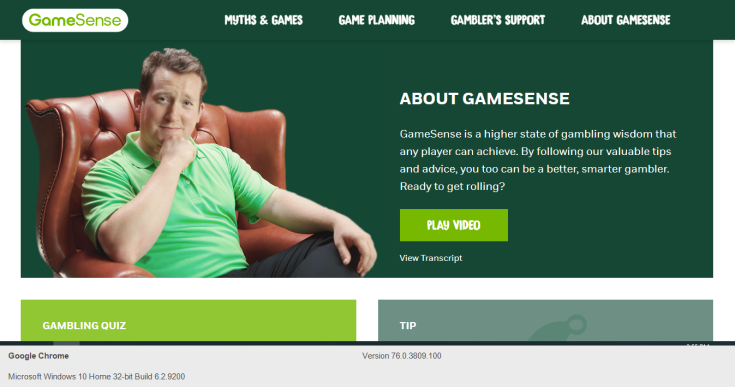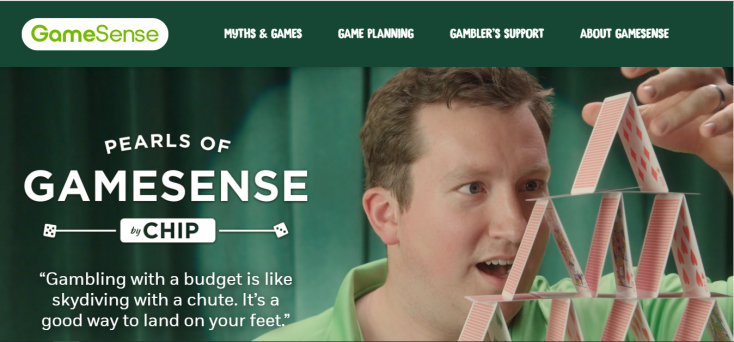 Two competing news stories ran yesterday related to the MGM Springfield casino here in western Massachusetts. One of them involves Chip, the douchey-looking gambler-mascot of GameSense, pictured above.
Two competing news stories ran yesterday related to the MGM Springfield casino here in western Massachusetts. One of them involves Chip, the douchey-looking gambler-mascot of GameSense, pictured above.
The first story is this headline:
MGM Resorts International Honored With National Council On Problem Gambling’s Public Awareness Award – Company’s GameSense program recognized again for transforming responsible gambling education. (1)
This came from the PR Newswire, which means it was put out by MGM Resorts International to congratulate itself. And what are they reaching around to pat themselves on the back for?

This doofus. Compulsive gamblers are supposed to listen to Chip, an actor in a web app, and then they won’t have a problem that turns tragic. (It did not turn out fine for this guy.) (4)
The reason casinos have to do public relations campaigns is not just because sometimes deeply indebted gamblers show up with a gun. It’s because most of their neighbors realize, sooner or later, that casinos are not good for communities.
To divert and dispel that energy, there is the Community Advisory Committee. MGM Springfield’s is made up of leaders from Springfield, MA. It’s supposed to meet quarterly and have real oversight. Instead, the Committee has not met at all, says Johnnie Ray McKnight, who is on the CAC. While the community group is being sidelined, some other committee is doing their job.
***
The National Council On Problem Gambling held their 33rd annual conference in Denver, Colorado, where they gave MGM Resorts an award for using GameSense to encourage gamblers to have a plan and be informed about how gambling works. At the GameSense for Massachusetts, I found our douchey friend, Chip. If you object to my calling him douchey, remember who his friends are.
I thought the National Council on Problem Gambling would be something like a consortium of non-profit and state agencies, public health professionals, and law enforcement working together to provide a seamless network of services to an at-risk population for predation by both legal and illegal gambling, as well as loansharking. If you thought that, too, then their PR is working.
It’s not like that. The organizational members of this National Council are virtually all casinos, lotteries, and others in the gaming industry.
Baylor University economist Earl Grinols concluded that addicted gamblers cost the United States between $32.4 billion and $53.8 billion per year, and that the long-term costs of introducing casinos into a region that didn’t previously have them outweighed the economic benefits by a greater than 3:1 ratio. (5) New England is glutted with casinos, causing them to turn on one another. MGM Springfield has sued the federal government for giving the Mashantucket Pequot and Mohegan tribes a casino license in East Windsor, CT, without a competitive bidding process. That case has delayed the tribes’ opening for at least a year. (12)
The propaganda onslaught to soften a community for exploitation begins long before ground is broken. MGM Springfield didn’t spring up overnight. In 1994, Casino Magic Corporation of Mississippi spent a third of a million dollars on a pro-casino astroturf campaign called Citizens for Springfield’s Future. (6) In 1995, another pro-casino group, The Committee for A Better Springfield Future, was championed by Chester Ardolino, the self-styled renegade cop, and older brother of Mayor Albano’s chief of staff, Anthony Ardolino. (7, 8) The brothers were investigated as part of a 1999 corruption probe into the city of Springfield. Anthony stepped down after a DUI, and in 2003 both brothers were charged with fraud and tax evasion in a deal in which they sold a local bar to known gangsters Carmine Manzi and his son, “Little Joe.”
There has been some local, corporate interest in a casino in Springfield for a long time. One early champion was the late Peter L. Picknelly of Peter Pan Bus Lines. (9) The business community downtown must be a small world, because Anthony Ardolino and Peter Picknelly and his son, Paul, reportedly attended the funeral of the slain Al Bruno, in 2003. (10) The Picknelly family own the only local interest in MGM Springfield, through the holding company, Blue Tarp. (11)
***
The mayor, city council president, and the MGM Springfield each have three members on the casino’s stalled committee. The other appointments include two from local chambers of commerce, but only the Springfield Regional Chamber of Commerce, has made one. The Massachusetts Latino Chamber of Commerce has not had their appointment confirmed. (2)
McKnight, who is one of the Springfield City Council President’s appointees, challenged Mayor Sarno in 2015 for his office, and is now running for City Council.
Casinos, online gambling companies, and state lotteries contort themselves like Cirque du Soleil performers to congratulate one another for their responsible gaming practices, to distract you from the fact that, in a rapidly growing industry that makes at least $37 billion a year in the United States, alone, (3) the costs of community harm are ours to bear.
The house always wins, as even Chip will admit, and gaming industry owners never stop worrying we’ll get smart to their con. So this week, they’re putting out statements from their friends to say MGM Resorts is super responsible, on the exact same day that a community leader is pointing out in the local paper that, at the community involvement theater in Springfield, the curtain has not risen on schedule.
References
- (2019, August 12). PR Newswire (USA). Available from NewsBank: Access World News: https://infoweb.newsbank.com/apps/news/document-view?p=AWNB&docref=news/17546E5874BBCD38.
- Goonan, P. (2019, August 12). Casino advisory panel has yet to meet. Republican, The (Springfield, MA), p. 002. Available from NewsBank: Access World News: https://infoweb.newsbank.com/apps/news/document-view?p=AWNB&docref=news/17544B926C11D470.
- Marcus, J. “Why Casinos are Becoming Like Landfills.” Published 23 December 2013 in TIME. http://nation.time.com/2013/12/23/why-casinos-are-becoming-like-landfills/ Accessed 25 October 2017.
- Rosengren, J. “How Casinos Enable Gambling Addicts.” Published December 2016 in The Atlantic. https://www.theatlantic.com/magazine/archive/2016/12/losing-it-all/505814/ Accessed 25 October 2017.
- Skolnik, S. “Betting the House: Five years later, Maryland’s casinos have left addiction, crime, and half-filled promises in their wake.” Published 11 August 2015. http://www.citypaper.com/news/features/bcp-081215-feature-gambling-20150811-story.html Accessed 25 October 2017.
- Turner, F. “Advocates, foes spend $363,000 in casino battle.” Published 3 November 1994 in The Republican. P. 1.
- “Q&A: Chester Ardolino.” Published 27 June 1993 in The Republican. P. B1.
- Pugh, S. “Pro-casino coalition gains a host of supporters.” Published 25 August 1995 in The Republican. P. B4.
- Turner, F. “Advocates, foes spend $363,000 in casino battle.” Published 3 November 1994 in The Republican. P. 1.
- Barry, S. “Bruno wake draws hundreds.” Published 29 November 2003 in The Republican. P. B01.
- Ring, D. “Paul Picknelly may have hit the jackpot with MGM Springfield casino plan.” Published 23 December 2013. http://www.masslive.com/politics/index.ssf/2013/12/mgm_springfield_partner_paul_picknelly_may_have.html Accessed 25 October 2017.
- Blair, R. (2019, August 11). Will Connecticut ever get a third casino? CAPITOL WATCH. Hartford Courant, The (CT), p. 3B. Available from NewsBank: Access World News: https://infoweb.newsbank.com/apps/news/document-view?p=AWNB&docref=news/1754278FBB11BC10.

Leave a comment